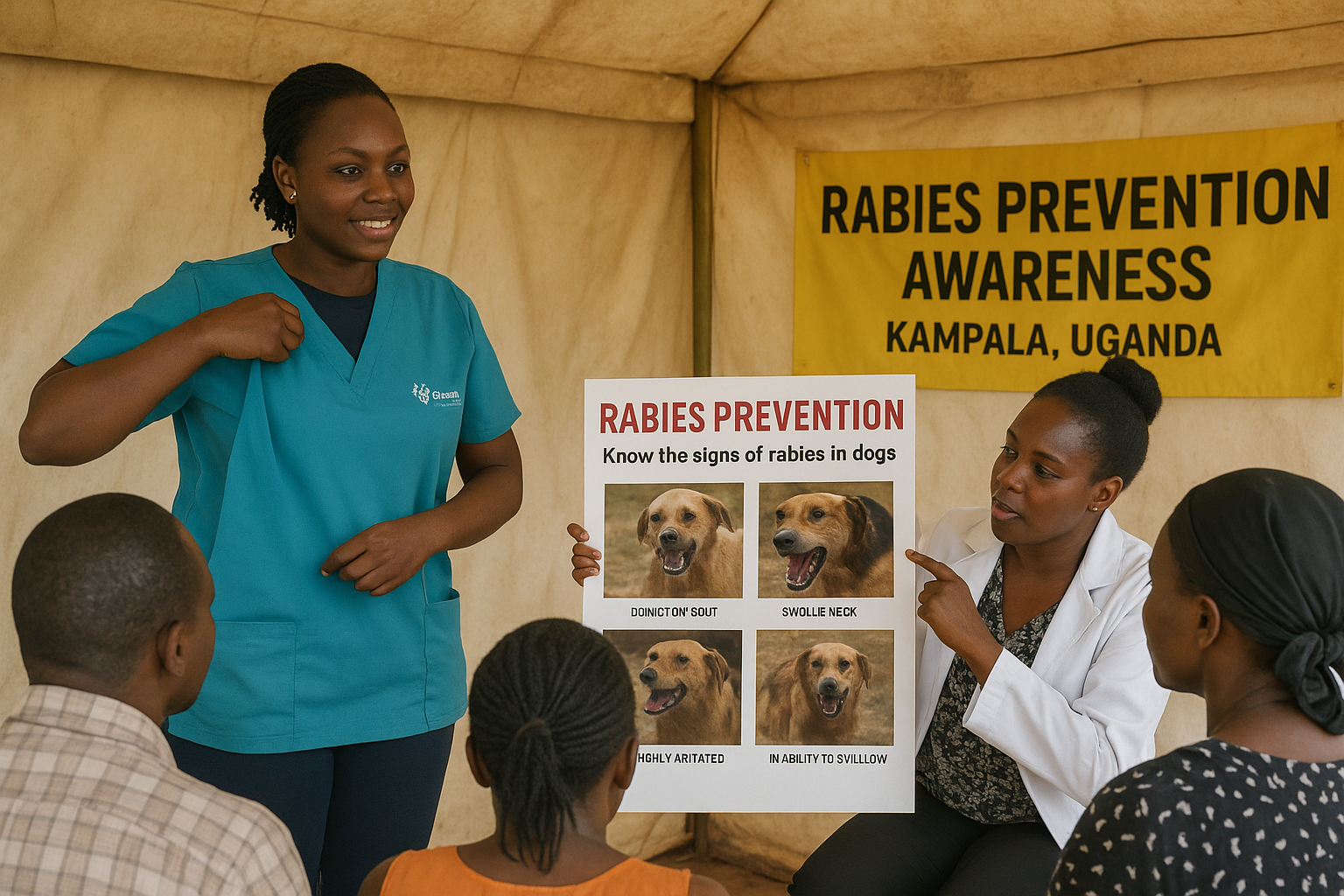
How a Misdiagnosed Case of Rabies Nearly Turned Tragic
Last year in Makindye, a loving dog owner named Fatima noticed her usually playful Labrador, Clowie, behaving strangely. She had stopped eating, was drooling excessively, and snapped whenever anyone tried to touch her. Thinking it was just a bad tooth infection or heat stress, Fatima took her to a local roadside animal handler for help.
The handler prescribed a few painkillers and herbal remedies — but Clowie only got worse. Within a few days, her bark changed to a deep growl, she became restless at night, and started biting at imaginary objects. Neighbors grew scared, and Fatima was heartbroken and confused. She didn’t know it yet, but Clowie was showing the classic signs of Rabies.
By the time she rushed her to Superior Animal Clinic in Makindye, our veterinary team quickly recognized what was really happening. After a thorough examination, we confirmed that Clowie had Rabies, not a dental issue. We immediately isolated her, provided specialized supportive care, and guided Fatima on what steps to take to protect her family and other pets.
Sadly, Fatima’s story is not unique — many dog owners in Kampala mistake Rabies for common illnesses like heatstroke, poisoning, or dog flu. This delay in seeking professional veterinary help often costs dogs their lives.
At Superior Animal Clinic, we have seen countless similar cases from areas like Ntinda, Old Kampala, Nsambya, Katwe, Buziga, Muyenga, Munyonyo, Rubaga, and Ndejje — where dogs suffer or die simply because the signs of Rabies were missed or misdiagnosed.
That’s why we’re raising awareness about Rabies in dogs, how to recognize it early, and where to find the best veterinary care in Kampala before it’s too late.
What is Rabies in Dogs?
Rabies is a deadly viral disease that affects a dog’s brain and nervous system. It is mostly spread through bites from infected animals, commonly stray dogs, bats, and wild animals in Uganda. Without proper treatment, Rabies is almost always fatal.
At Superior Animal Clinic, we treat Rabies with careful protocols, advanced medications, and veterinary expertise to give your dog the best chance of survival.
Most Common Types of Rabies in Uganda
In Uganda, the Rabies cases we treat mostly fall into two categories:
- Furious Rabies – Dogs become unusually aggressive, bite everything, drool excessively, and have erratic behavior.
- Dumb (Paralytic) Rabies – Dogs appear weak, unable to swallow, and may have paralysis in the hind legs, making it easy to overlook initially.
Both forms require immediate veterinary care.
Common Causes of Rabies in Dogs in Kampala
Rabies doesn’t just happen suddenly — there’s always a reason behind it. In Kampala and surrounding areas, most cases of Rabies in dogs are caused by preventable factors. Understanding these causes helps you protect your pet before it’s too late.
Here are the most common causes of Rabies among dogs that our veterinary team at Superior Animal Clinic in Makindye encounters every month:
1. Bites from Infected Dogs or Wild Animals
This is the number one cause of Rabies in Uganda.
When a rabid animal bites your dog, the virus enters through the wound and slowly travels to the brain. Once it reaches there, it causes the severe neurological signs we recognize as Rabies.
In Kampala, dogs often get bitten by stray dogs, foxes, or bats — especially in areas like Katwe, Rubaga, Makindye, Nsambya, Buziga, and Mutundwe, where stray animals roam freely.
👉 Tip from Superior Animal Clinic: If your dog gets bitten, don’t wait — bring them immediately for post-bite vaccination and wound cleaning. Time is critical.
2. Failure to Vaccinate Your Dog
Many dog owners in Kampala delay or skip annual Rabies vaccinations — often because their dog “looks healthy.” Unfortunately, Rabies can stay hidden for weeks or months before showing symptoms.
At Superior Animal Clinic, we strongly advise that every puppy gets their first Rabies vaccine at 3 months old and yearly boosters thereafter.
Vaccination is the most effective way to prevent Rabies — far safer and cheaper than treatment after infection.
3. Free-Roaming and Unsupervised Dogs
Dogs that wander outside the compound unsupervised are at high risk of encountering infected strays.
We often treat Rabies cases from neighborhoods like Muyenga, Lubowa, Seguku, and Ndejje, where dogs freely mix with others on the street.
👉 Always keep your dog within a fenced area or walk them on a leash. Even one playful bite from an infected animal can be fatal.
4. Poor Hygiene and Overcrowded Living Conditions
In areas where dogs live closely together — such as urban settlements and slum communities — disease spreads faster. Poor sanitation attracts rodents and stray animals, which can be carriers of the Rabies virus.
Keeping your dog’s living area clean and enclosed reduces the chance of contact with potentially infected animals.
5. Adoption or Rescue of Unvaccinated Stray Dogs
Many kind-hearted dog lovers in Kampala adopt stray or abandoned dogs — but few realize the hidden Rabies risk that comes with it.
If you’ve rescued a dog from the streets of Katwe, Nsambya, or Old Kampala, bring it immediately to Superior Animal Clinic for Rabies testing and vaccination.
This quick step could save both your dog’s life and your family’s.
6. Lack of Awareness and Delayed Veterinary Attention
One of the biggest causes of death from Rabies is misdiagnosis and late treatment.
Some dog owners first try home remedies, herbs, or painkillers, believing their dog is just sick from food poisoning or stress.
By the time the real symptoms appear — aggression, drooling, difficulty swallowing — it’s often too late.
At Superior Animal Clinic, we urge dog owners in Ntinda, Naguru, Nakawa, Bugolobi, and Makindye to seek immediate veterinary help if your dog is bitten, behaves abnormally, or suddenly becomes aggressive.
7. Movement Between Regions Without Proper Health Checks
Some dogs are brought from rural areas into Kampala without updated vaccination records. These dogs may unknowingly carry the Rabies virus, posing a danger to pets and people alike.
Before introducing a new dog to your home, visit Superior Animal Clinic for a complete health check and vaccination review.
💡 In Summary
Most causes of Rabies in Kampala can be completely prevented through simple, consistent steps:
- Vaccinate your dog annually
- Supervise outdoor activities
- Avoid stray animals
- Seek prompt veterinary care for any bite or suspicious behavior
Your vigilance can mean the difference between life and death for your pet.
If you live in Makindye, Nsambya, Muyenga, Rubaga, or anywhere in Kampala and suspect your dog has been exposed to Rabies, don’t take chances.
📞 Call or WhatsApp Superior Animal Clinic at +256771909946 — our team is available to diagnose, treat, and protect your dog from Rabies and other infectious diseases.
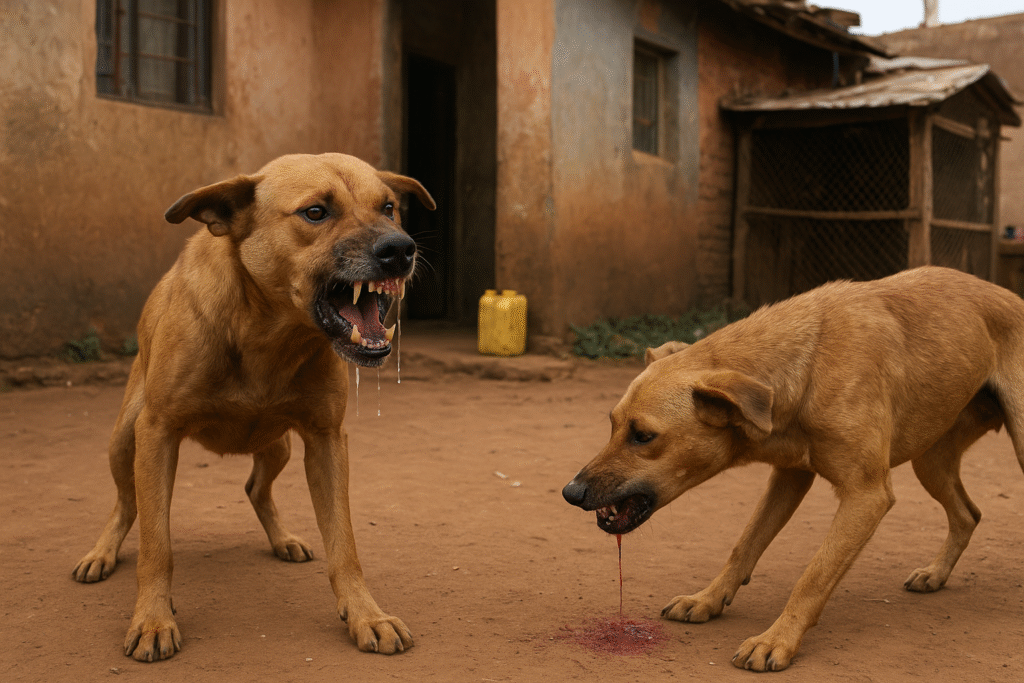
Predisposing Factors — Which Dogs In Uganda Are Most at Risk and Why
Even though any dog can catch Rabies, some are far more at risk than others. At Superior Animal Clinic in Makindye, we’ve noticed certain patterns over the years — specific breeds, environments, and lifestyles that make dogs more vulnerable to Rabies infection.
Understanding these predisposing factors helps dog owners in Kampala take early action to protect their pets before danger strikes.
🐶 1. Unvaccinated Dogs
This is the highest risk group. Dogs that have never received the Rabies vaccine — or missed their annual booster shot — have almost no protection against the virus.
Many cases we see at Superior Animal Clinic come from well-loved pets whose owners simply forgot to vaccinate on time. Even one missed booster can open the door to infection.
👉 Pro Tip: Set a reminder every year for your dog’s Rabies vaccine. It’s quick, affordable, and lifesaving.
🐾 2. Puppies and Young Dogs
Puppies under 6 months of age have weaker immune systems, making them highly susceptible to viruses — including Rabies.
Many dog owners in Kampala mistakenly believe puppies are “too young” to get vaccinated, but the truth is, Rabies vaccination starts as early as 3 months.
At Superior Animal Clinic, we give age-appropriate Rabies vaccines and guide new dog owners on proper puppy care and disease prevention.
🦮 3. Free-Roaming or Outdoor Dogs
Dogs that are allowed to wander freely outside compounds or roam the streets are constantly at risk of bites and scratches from infected stray animals.
This is especially common in neighborhoods like Katwe, Nsambya, Rubaga, Mutundwe, and Ndejje, where stray dog populations are high.
If your dog spends a lot of time outdoors, make sure it is fully vaccinated and regularly checked by a qualified vet in Kampala, such as Superior Animal Clinic on Salaama Road, Makindye.
4. Dogs in Multi-Pet or Densely Populated Areas
In communities where several dogs live together — or where pets mix freely — Rabies can spread rapidly through bites, saliva, or shared feeding bowls.
We’ve seen outbreaks in urban neighborhoods like Muyenga, Lubowa, Seguku, and Bugolobi, where pet owners often take their dogs for walks in shared spaces without knowing the vaccination status of other dogs.
👉 Always verify that neighboring or playgroup dogs are up-to-date on vaccinations before allowing close contact.
5. Stray, Rescued, or Newly Adopted Dogs
Adopting or rescuing a dog is a beautiful act of kindness — but it can also come with hidden risks. Many rescued dogs in Kampala come from streets, shelters, or rural villages where Rabies vaccination is uncommon.
Before bringing a new dog into your home, visit Superior Animal Clinic for a complete Rabies screening and vaccination. This ensures both your new pet and existing dogs stay safe.
🌡️ 6. Dogs in Areas with High Stray Populations
Rabies tends to persist longer in regions with large stray dog populations. Neighborhoods such as Katwe, Nsambya, Old Kampala, Rubaga, and Buziga report more Rabies cases every year.
Even if your dog doesn’t leave the compound often, an infected stray could jump the fence or bite through it, exposing your pet.
Keeping your dog’s vaccinations up to date is the only true protection.
7. Dogs with Weak Immune Systems
Dogs recovering from illness, malnutrition, or parasite infections (like worms or ticks) often have weakened immunity, making them less capable of fighting viruses — including Rabies.
At Superior Animal Clinic, we recommend routine deworming, parasite control, and nutritional support to help keep your dog’s immune system strong.
💡 Key Takeaway
If your dog is unvaccinated, young, frequently outdoors, or newly adopted, it’s at high risk of Rabies infection.
The good news? Rabies is 100% preventable with proper veterinary care.
How We Treat Rabies in Uganda at Superior Animal Clinic
At Superior Animal Clinic in Makindye, Kampala, we handle Rabies cases in dogs with the highest level of professionalism, safety, and compassion. Rabies is one of the most serious viral diseases affecting dogs and humans in Uganda, and once the symptoms appear, it is almost always fatal.
Our main goal as veterinarians is to protect your dog, your family, and the community through early detection, preventive vaccination, and humane management of infected animals.
🩺 Step-by-Step Approach to Managing Suspected Rabies Cases
When a dog is brought to Superior Animal Clinic with a history of a bite, strange behavior, or early neurological signs, our veterinary team follows a strict and internationally approved procedure:
1. Immediate Isolation and Safety Precautions
The first step is to safely isolate the dog to prevent possible transmission to humans or other pets. Our clinic is equipped with secure isolation areas that meet animal welfare standards.
Staff members use protective gear during handling, and all surfaces are disinfected according to veterinary biosafety guidelines.
2. Comprehensive Examination and Case Evaluation
We carefully review the dog’s medical history, vaccination record, and symptoms. If the dog was recently bitten or exposed to a suspected rabid animal, we classify it as a suspected Rabies case and begin appropriate observation or post-exposure management.
3. Rabies Testing and Diagnosis
Confirming Rabies requires laboratory testing of brain tissue, which can only be done after the animal’s death.
In Uganda, live testing is not possible for safety reasons.
This means that once Rabies symptoms appear, there is no available test or cure that can save the dog’s life.
4. Humane Euthanasia (When Rabies Symptoms Are Present)
This is the most difficult but necessary part of Rabies management.
If a dog begins to show clear Rabies symptoms — such as aggression, excessive drooling, paralysis, difficulty swallowing, or unprovoked biting — the humane and ethical decision is euthanasia.
At Superior Animal Clinic, we perform euthanasia painlessly and humanely, ensuring the dog does not suffer.
This step protects your family, other pets, and the wider community from infection, since a rabid dog can transmit the virus even through saliva or small scratches.
After euthanasia, samples may be sent for laboratory confirmation, and we advise the pet owner on post-exposure precautions for humans who may have been in contact.
5. Post-Exposure Care for Other Dogs and Humans
If your dog has been exposed to a suspected rabid animal but is not yet showing symptoms, there is still hope.
We immediately administer post-exposure Rabies vaccinations, clean the wound thoroughly, and provide antibiotics and pain management.
We also guide you on human post-exposure vaccination, which is critical after contact with an infected dog.
💊 Drugs and Supportive Treatments Used in Rabies Management
While there is no cure once symptoms develop, supportive care is offered for suspected cases before symptom onset:
- Anti-inflammatory drugs – To reduce pain and swelling at the bite site.
- Antibiotics – To prevent secondary infections.
- Wound management solutions – For immediate cleansing and disinfection.
- Rabies vaccine and anti-rabies serum – For exposed but asymptomatic dogs (post-exposure prophylaxis).
These medications can help delay or prevent the virus from reaching the brain — but only if administered before clinical signs appear.
🐾 Recovery and Follow-Up Care
If a dog receives post-exposure vaccination early, we schedule follow-up doses at specific intervals (Day 0, 3, 7, 14, and 28).
During this time, the dog must be kept indoors and monitored for behavioral changes.
Our team at Superior Animal Clinic provides guidance, counselling, and vaccination reminders to ensure your dog completes the full treatment course.
🧠 Our Message to Dog Owners
At Superior Animal Clinic, we understand that losing a pet to Rabies is emotionally devastating — but protecting your family’s safety must come first.
Rabies is a public health emergency, and humane euthanasia is sometimes the only responsible option once symptoms appear.
However, you can prevent this heartbreak entirely through early vaccination and regular vet checkups.
Home Remedies: What Works and What Doesn’t
While some dog owners try home remedies like herbal pastes, garlic, or honey, these do not cure Rabies. Rabies is life-threatening and requires professional care. Home remedies may only support comfort but are never a substitute for veterinary treatment.
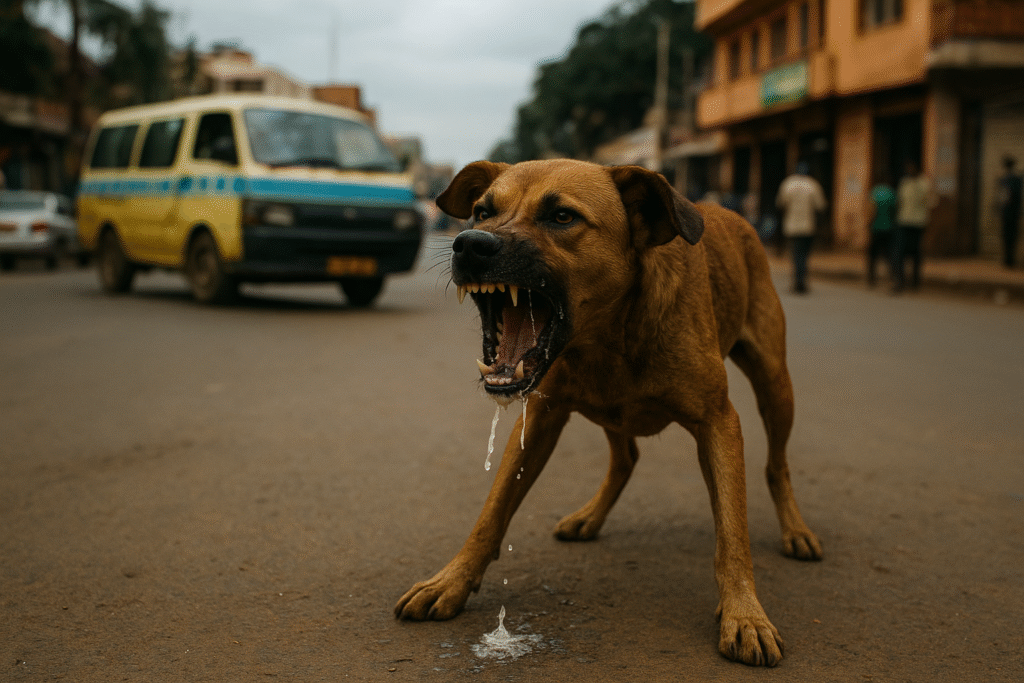
Diet for Dogs with Rabies
During treatment, dogs need easily digestible, high-energy foods. We recommend:
- Soft boiled chicken or eggs
- Rice or mashed potatoes
- Special veterinary diets that support immune health
Avoid hard kibble if your dog has difficulty swallowing or drooling.
🛡️ How to Prevent Rabies Among Dogs in Uganda
Rabies is one of those diseases that’s 100% preventable—but almost always fatal once symptoms appear. The good news is that dog owners in Kampala can do a lot to protect their pets and communities. At Superior Animal Clinic in Makindye along Salaama Road, we believe prevention is not just easier and cheaper—it’s also the most compassionate way to keep your furry friend safe and healthy.
Let’s break down exactly how to prevent rabies in dogs and what every responsible pet owner in Uganda should know:
🩺 1. Vaccinate Your Dog Regularly
The rabies vaccine is the single most effective way to prevent the disease. In Uganda, dogs should receive their first rabies vaccination at around 3 months of age, followed by annual boosters.
At Superior Animal Clinic, we use WHO-approved rabies vaccines that are safe, affordable, and effective.
👉 Tip: Keep your dog’s vaccination card safe and bring it along during each visit. Our vet team can send you reminder messages on WhatsApp (+256771909946) when your next shot is due.
🦮 2. Keep Your Dog Indoors or Supervised
Allowing your dog to roam freely increases the risk of being bitten by stray or infected dogs. Rabies spreads mainly through bites, scratches, or saliva contact from an infected animal.
If you live in areas like Makindye, Katwe, Nsambya, Kasubi, or Lubowa, where stray dog populations are high, it’s best to:
- Keep your dog on a leash during walks.
- Fence your compound properly.
- Avoid letting your dog interact with unknown or unvaccinated dogs.
3. Maintain Good Nutrition and Health
Healthy dogs have stronger immune systems and are less likely to get infected even after exposure.
Feed your dog a balanced diet with protein (chicken, beef, fish), carbohydrates (rice, maize), and vegetables.
At Superior Animal Clinic, our vets can also recommend vitamin supplements and immune boosters for dogs recovering from illnesses or malnutrition.
4. Control Stray Dog Populations Around You
Rabies in Kampala is often spread by unvaccinated stray dogs. You can help by:
- Reporting stray dog bites to your local veterinary officer or health center.
- Encouraging your neighbors to vaccinate their pets.
- Supporting community vaccination campaigns, many of which we help organize at Superior Animal Clinic in Makindye, Buziga, Muyenga, and nearby areas.
5. Immediate Action After a Dog Bite
If your dog is bitten or scratched by another dog:
- Wash the wound immediately with soap and running water for at least 15 minutes.
- Disinfect with iodine or alcohol if available.
- Call or visit Superior Animal Clinic right away for professional assessment and vaccination.
The faster you act, the higher the chances your dog will stay safe and rabies-free.
6. Educate Your Family and Neighbors
Many rabies cases in Uganda occur because people simply don’t know how serious the disease is. Teach your family members—especially children—to:
- Avoid playing with unknown dogs.
- Report any dog bite immediately.
- Never try to treat a dog bite at home without consulting a vet.
Areas in Kampala Where Rabies Is Most Common
From our experience at Superior Animal Clinic, rabies cases are more frequently reported in:
- Makindye and Nsambya — due to high pet populations and stray dogs.
- Katwe, Kasubi, and Old Kampala — where free-roaming dogs are common.
- Lubowa, Zana, and Seguku — because of semi-urban setups with fewer vaccination campaigns.
These areas benefit most from annual vaccination drives and public awareness campaigns.
❤️ The Bottom Line
Rabies prevention starts with responsible dog ownership. Vaccinate, supervise, feed well, and act fast after any dog bite. At Superior Animal Clinic in Makindye, we’re always ready to help keep your dogs healthy and rabies-free.
🐾 Animals in Uganda with the Highest Rabies Cases and Why
When most people in Uganda think of rabies, they immediately think of dogs — and rightly so. But dogs aren’t the only carriers of this deadly virus. Understanding which animals are most likely to spread rabies helps dog owners and communities stay alert and take proper preventive action.
At Superior Animal Clinic in Makindye along Salaama Road, our veterinary team has handled several rabies-related cases from Kampala and surrounding districts, and here’s what we’ve observed about which animals are most affected and why.
🐕 1. Dogs – The Main Source of Rabies in Uganda
Dogs are responsible for over 90% of rabies cases in Uganda.
The main reasons include:
- Low vaccination rates, especially among stray and village dogs.
- Uncontrolled breeding leading to large stray populations.
- Frequent dog-to-dog fights that spread the virus through bites and saliva.
- Limited public awareness about routine rabies vaccination schedules.
📍 Areas like Makindye, Katwe, Nsambya, Kasubi, and Rubaga tend to have higher dog rabies reports due to dense human and dog populations.
🐈 2. Cats – Silent but Risky Carriers
Cats are the second most common rabies carriers we see at Superior Animal Clinic.
Because cats often roam freely and hunt small animals at night, they can easily get bitten by infected dogs or wildlife.
Many cat owners in Kampala don’t realize that cats also need rabies vaccination every year, just like dogs.
💡 If you live in areas like Muyenga, Buziga, Munyonyo, or Ntinda, where many cats move outdoors, it’s vital to have your cat vaccinated to protect both your family and other pets.
🦝 3. Mongooses, Civets, and Other Wild Animals
In rural parts of Uganda — including Mityana, Wakiso, and Mpigi — rabies outbreaks are sometimes linked to wild animals like mongooses, civet cats, and genets.
These animals act as reservoirs of the rabies virus. When they wander into homesteads or attack poultry and pets, they can transmit the disease through bites or scratches.
Wild animals are rarely vaccinated, making them a continuous source of infection to unprotected domestic animals.
🐄 4. Cattle and Goats – Accidental Victims
Livestock like cows, goats, and sheep can also get infected, usually after being bitten by a rabid dog while grazing.
Farmers in places like Ndejje, Lubowa, and Seguku occasionally report livestock showing strange symptoms such as aggression or drooling — which often turns out to be rabies.
While cattle and goats don’t usually transmit rabies back to humans, they’re a sign that the virus is active in the community and that dogs nearby are not vaccinated.
🦇 5. Bats – Rare but Potential Carriers
Though not common, fruit bats and insect-eating bats can carry rabies-like viruses.
These are mostly found in caves or old buildings in rural Uganda.
While transmission to dogs is rare, the possibility exists if a curious dog catches or bites an infected bat.
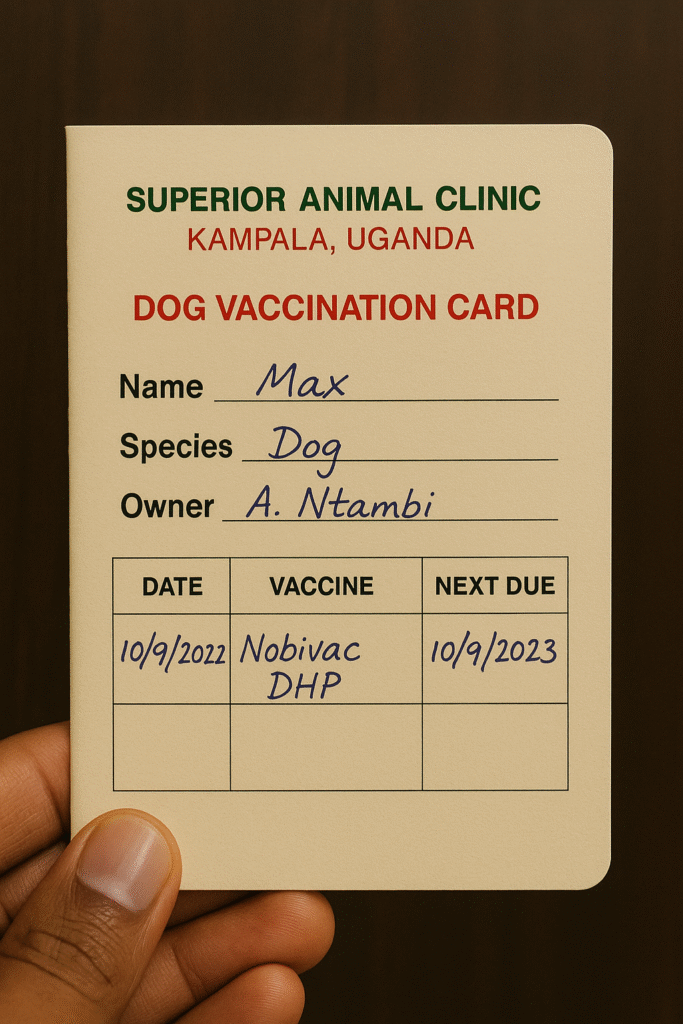
Why Rabies Persists Among Animals in Uganda
Several factors make rabies difficult to eliminate completely:
- Poor vaccination coverage — many pets never receive their first or booster shots.
- Free-roaming dog populations that are hard to monitor.
- Limited awareness among pet owners about how rabies spreads.
- Inadequate stray control programs in urban centers.
- Cross-species transmission between wild and domestic animals.
🩺 What You Can Do as a Pet Owner
At Superior Animal Clinic, we encourage pet owners to take rabies prevention seriously by:
- Vaccinating all pets (dogs and cats) every year.
- Reporting stray or suspicious animals to local authorities.
- Bringing any bitten or scratched pet for immediate veterinary assessment.
Prognosis: What Happens Without Treatment
Untreated Rabies is almost always fatal. Dogs will develop:
- Severe neurological symptoms
- Aggression or paralysis
- Death within 7–10 days after symptoms appear
That’s why immediate veterinary intervention at Superior Animal Clinic is crucial.
❓ FAQs About Rabies in Dogs — Uganda Edition
🩺 1. What is rabies in dogs?
Rabies is a deadly viral disease that affects the brain and nervous system of dogs, cats, and humans. It spreads mainly through the bite or saliva of an infected animal.
Once symptoms start, rabies is almost always fatal, which is why early vaccination is crucial.
2. How much does a rabies vaccine cost in Uganda?
The cost of rabies vaccination in Uganda ranges from UGX 30,000 to UGX 80,000 per dose, depending on the clinic and vaccine brand.
At Superior Animal Clinic in Makindye, we offer affordable WHO-approved rabies vaccines that are safe and long-lasting, with discounts for multiple pets or during community vaccination drives.
📞 Call or WhatsApp +256771909946 to book your dog’s vaccination today.
3. Where can I get my dog vaccinated against rabies in Uganda?
You can get your dog vaccinated at Superior Animal Clinic, located in Makindye along Salaama Road, Kampala.
We also serve nearby areas such as Ntinda, Muyenga, Nsambya, Munyonyo, Buziga, Katwe, Kololo, Bukoto, Lubowa, Ndejje, and Rubaga.
Our team provides both in-clinic and home vaccination services, ensuring your pet gets protection wherever you are in Kampala.
4. Do you offer home-call rabies vaccination in Kampala?
✅ Yes! Superior Animal Clinic provides home-call rabies vaccination services across Kampala.
Whether you’re in Ntinda, Muyenga, Buziga, Munyonyo, or Lubowa, our professional vet team can come to your home to vaccinate your dog safely and conveniently.
This service is especially ideal for busy pet owners or dogs that are anxious about traveling.
📲 Book a home vaccination visit now on WhatsApp: +256771909946.
5. How much does it cost to euthanize a rabid dog in Uganda?
If a dog is confirmed to have rabies, humane euthanasia is the only recommended option to prevent suffering and virus spread.
The cost of euthanizing a rabid dog in Uganda typically ranges between UGX 80,000 and UGX 150,000, depending on the dog’s size and condition.
At Superior Animal Clinic, our veterinarians ensure the process is painless, respectful, and professionally handled in accordance with animal welfare standards.
6. Which is the best veterinary hospital for rabies vaccination in Uganda?
The best veterinary hospital for rabies vaccination in Uganda is Superior Animal Clinic, located in Makindye along Salaama Road, Kampala.
We’re trusted by hundreds of pet owners for:
- Professional, caring vets.
- Affordable rabies vaccination packages.
- Home visit services.
- 24/7 emergency response for dog bites and suspected rabies cases.
📍 We proudly serve all major areas — Ntinda, Old Kampala, Katwe, Nsambya, Nakawa, Muyenga, Lubowa, Kololo, Bukoto, and beyond.
🐾 7. How often should I vaccinate my dog against rabies?
Dogs should get their first rabies vaccination at 3 months, then a booster shot every year.
Annual boosters keep your pet’s immunity strong and help prevent outbreaks in Kampala.
We send free reminders via WhatsApp when your next shot is due — just register your pet with Superior Animal Clinic.
8. What should I do if my dog is bitten by another dog in Kampala?
If your dog is bitten or scratched:
- Wash the wound immediately with soap and water for at least 15 minutes.
- Disinfect with iodine or alcohol if available.
- Call Superior Animal Clinic (+256771909946) immediately for an emergency evaluation and post-exposure vaccination.
Never delay — rabies spreads fast and early action can save your pet’s life.
9. Can I treat rabies at home using local remedies?
Unfortunately, there is no home remedy or herbal cure for rabies.
Once symptoms appear, the disease is 100% fatal in animals.
However, cleaning the wound immediately and rushing to a vet for rabies vaccination and post-exposure treatment can prevent infection from developing.
Always contact Superior Animal Clinic — we offer emergency rabies prevention and home-call services across Kampala.
10. Can humans get rabies from dogs in Uganda?
Yes. Humans can get rabies through bites, scratches, or saliva contact from an infected dog.
If you’ve been bitten or exposed, go to a medical facility immediately for post-exposure vaccination — and bring the dog to Superior Animal Clinic for evaluation.
11. Is the rabies vaccine safe for puppies?
Yes. The rabies vaccine is completely safe for puppies as long as they are over 12 weeks old.
It protects them early before they start exploring or playing outdoors where exposure risk is high.
At Superior Animal Clinic, we use safe, approved vaccines suitable for all breeds and ages.
12. How can I tell if my dog’s rabies vaccine is due?
If you’re not sure when your dog was last vaccinated, bring the vaccination card or visit Superior Animal Clinic for a quick health check and vaccine record review.
We’ll help you stay up-to-date with your dog’s shots — and you’ll never miss another vaccination reminder.
13. Which areas in Kampala report the most rabies cases?
Rabies cases are more frequently reported in:
- Makindye
- Katwe
- Nsambya
- Old Kampala
- Kasubi
- Lubowa
- Seguku
- Ndejje
- Nakawa
- Rubaga
These areas have many stray dogs and low vaccination rates, which is why Superior Animal Clinic runs periodic community vaccination campaigns there.

14. Why choose Superior Animal Clinic for rabies vaccination in Uganda?
Because we’re more than just a vet clinic — we’re your partner in keeping pets safe.
- 🏥 Located conveniently in Makindye, along Salaama Road, Kampala.
- 🩺 Professional veterinary care with a focus on prevention.
- 🚗 Home-call vaccination services available citywide.
- 💰 Affordable prices with no hidden costs.
- 📞 24/7 support via WhatsApp: +256771909946
We proudly serve pet owners in Ntinda, Muyenga, Munyonyo, Buziga, Nakawa, Rubaga, Bukoto, Kololo, Bulindo, Kulambiro, and across Kampala.
🐾 15. Can stray dogs in Kampala transmit rabies to my pet?
Yes. Stray dogs are the main carriers of rabies in Kampala, especially in areas like Makindye, Katwe, Nsambya, Lubowa, and Rubaga.
Always ensure your dog is vaccinated annually and avoid unsupervised interactions with strays.
Superior Animal Clinic provides post-exposure vaccination if your dog has been bitten by a stray.
🐕 16. How do I recognize early signs of rabies in dogs?
Early signs include:
- Sudden aggression or unusual biting behavior
- Excessive drooling or foaming at the mouth
- Restlessness and difficulty sleeping
- Loss of appetite or drinking difficulty
If your dog shows these signs, do not attempt home treatment — bring them to Superior Animal Clinic in Makindye immediately.
17. Can rabies vaccination be done at home in Kampala?
Yes! Superior Animal Clinic offers home-call rabies vaccination services across Kampala, including Ntinda, Muyenga, Buziga, Munyonyo, Lubowa, and Kololo.
Our trained vets safely vaccinate your dog at home, reducing stress for both pets and owners.
💊 18. Are there any side effects of the rabies vaccine in dogs?
Minor side effects like mild swelling at the injection site, temporary lethargy, or low-grade fever may occur, but these usually resolve within 24–48 hours.
Serious reactions are extremely rare.
At Superior Animal Clinic, we monitor every dog after vaccination to ensure their safety.
19. How soon after a bite should my dog get vaccinated?
For post-exposure prophylaxis to be effective, vaccination should be given within 24–48 hours after a bite.
Our vets at Superior Animal Clinic provide emergency rabies vaccinations to exposed dogs across Kampala, preventing the disease from developing.
20. Can rabies be prevented in puppies under 3 months?
Puppies younger than 3 months can receive early protection with maternal antibodies and should be vaccinated at 3 months, followed by booster shots annually.
Superior Animal Clinic guides pet owners on the best vaccination schedule for puppies in Kampala and surrounding areas.
21. Do you offer discounted rabies vaccination for multiple pets?
Yes! Superior Animal Clinic offers affordable packages for households with multiple dogs or cats.
This makes it easier for families across Makindye, Ntinda, Muyenga, Buziga, and Bukoto to protect all their pets without breaking the bank.
🐾 22. Is rabies vaccination required by law in Uganda?
Yes. By law, all dogs in Uganda must be vaccinated against rabies annually.
Compliance protects your dog and your community from this fatal disease. Superior Animal Clinic helps pet owners stay compliant with local veterinary regulations.
23. What is the process if my dog is suspected of having rabies?
If symptoms appear, the steps are:
- Immediate isolation of the dog
- Veterinary assessment at Superior Animal Clinic
- Humane euthanasia if the dog is symptomatic
- Post-exposure care for other pets or humans exposed
This protocol prevents transmission and ensures safety for everyone.
24. Which areas in Kampala have the highest rabies exposure risk?
High-risk areas include:
- Makindye, Katwe, Nsambya, Buziga, Muyenga, Lubowa, Rubaga, Ntinda, Old Kampala, Kololo, Bukoto, and Ndejje
These are areas with high stray dog populations and low vaccination coverage, making professional vaccination critical.
🧍♂️ 25. Can humans get vaccinated after exposure to a rabid dog?
Yes. If a human is bitten by a rabid dog, immediate post-exposure vaccination is essential.
At Superior Animal Clinic, we coordinate with local medical centers to ensure both your pet and your family receive proper care.
🐾 26. What is the cost of home-call rabies vaccination in Kampala?
At Superior Animal Clinic, home-call rabies vaccination costs UGX 40,000–100,000, depending on your location and the number of pets.
We cover all major areas including Makindye, Ntinda, Muyenga, Buziga, Munyonyo, Lubowa, Bukoto, and Kololo.
27. Do you provide emergency rabies treatment for bitten dogs in Kampala?
Yes. If your dog is bitten by a stray or suspected rabid animal, call Superior Animal Clinic immediately at +256771909946.
We provide post-exposure vaccination, wound care, and monitoring for pets across Nsambya, Katwe, Rubaga, Old Kampala, and Nakawa.
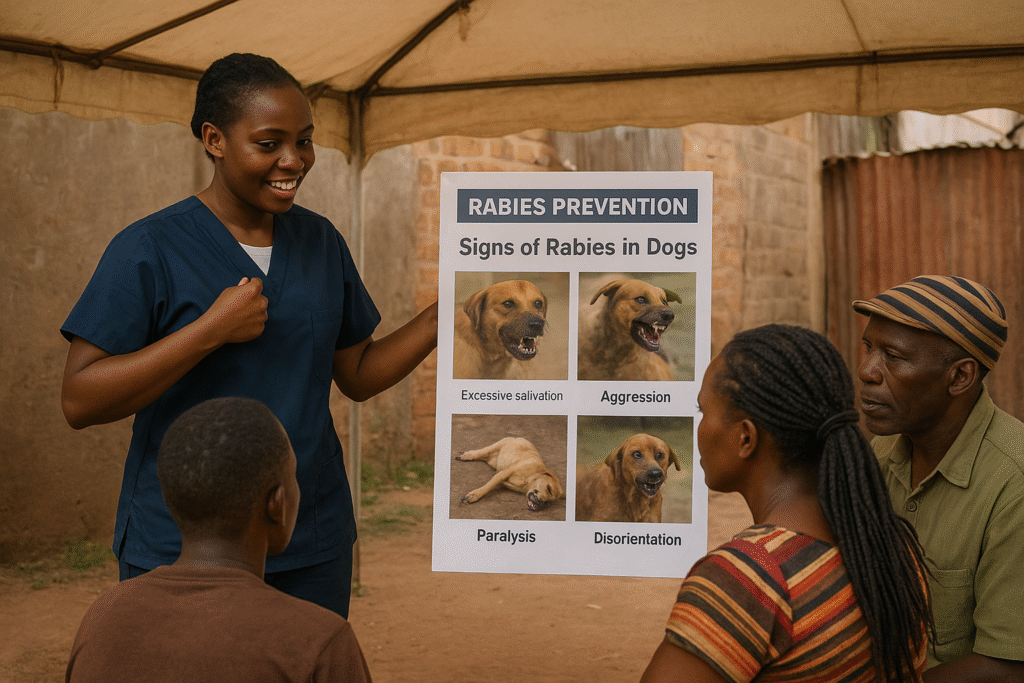
28. Are there special rabies vaccines for puppies and senior dogs?
Yes. Puppies (from 3 months) and senior dogs (over 8 years) require age-appropriate rabies vaccines to ensure safety and effectiveness.
Our vets at Superior Animal Clinic customize vaccination schedules for each dog.
29. How do I schedule a home rabies vaccination in Kampala?
Simply call or WhatsApp +256771909946 with your location and dog details.
Our team can visit homes in Ntinda, Muyenga, Buziga, Munyonyo, Makindye, Lubowa, Kololo, Bukoto, and surrounding areas to vaccinate pets safely.
30. How often should dogs get rabies boosters in Uganda?
Dogs should receive annual boosters. Puppies start at 3 months, followed by a one-year booster, then yearly thereafter.
Superior Animal Clinic offers automatic reminders via WhatsApp to ensure pets stay protected.
🐕 31. Can Superior Animal Clinic vaccinate dogs in other Kampala neighborhoods?
Yes! We provide in-clinic and home-call vaccination services across all major neighborhoods, including Katwe, Nsambya, Zana, Nakasero, Seguku, Bugolobi, Lubowa, and Kulambiro.
32. What to do if my dog shows rabies symptoms at home?
Do not attempt home treatment.
Immediately isolate your dog and contact Superior Animal Clinic (+256771909946) for professional assessment.
If the dog is symptomatic, humane euthanasia may be necessary to prevent transmission.
33. Can rabies be prevented in free-roaming dogs in Kampala?
Yes, through:
- Annual vaccination
- Supervised roaming or leashing
- Community awareness and reporting of stray dogs
Superior Animal Clinic supports community vaccination drives in Makindye, Muyenga, Nsambya, and Rubaga.
🐾 34. Does Superior Animal Clinic provide rabies vaccination certificates?
Yes. Every vaccinated dog receives a WHO-approved rabies vaccination certificate, which is essential for travel, licensing, or adoption purposes.
35. Can rabies vaccination protect my dog from all types of rabies in Uganda?
Yes. Our WHO-approved vaccines at Superior Animal Clinic protect dogs against the most common rabies strains found in Uganda, including those transmitted by stray dogs, wild animals, and bats.
36. Is rabies vaccination mandatory for pet registration in Kampala?
Yes. Annual rabies vaccination is a legal requirement for dog owners in Kampala.
Superior Animal Clinic provides certificates and reminders to ensure compliance with local regulations.
🐶 37. Can I combine rabies vaccination with other pet services at Superior Animal Clinic?
Yes. During a single visit, we can provide:
- Rabies vaccination
- Deworming and parasite control
- Health check-ups
- Nutritional advice
This is especially convenient for pet owners in Makindye, Ntinda, Muyenga, Bukoto, and surrounding areas.
🐾 Conclusion
Rabies is deadly but completely preventable. Don’t wait until it’s too late — protect your dog and family with timely vaccination.
At Superior Animal Clinic in Makindye along Salaama Road, we offer affordable rabies vaccines, home-call services, and expert veterinary care for dogs across Kampala — including Ntinda, Muyenga, Munyonyo, Nsambya, Katwe, Kasubi, Nakawa, Lubowa, and Rubaga.
📞 Call or WhatsApp +256771909946 today to book your dog’s vaccination and keep your home rabies-free.
Because prevention starts with you — and care starts at Superior Animal Clinic.
Keep your dog safe from rabies in Kampala. Superior Animal Clinic offers vaccination, emergency care, and home visits. Call +256771909946.
